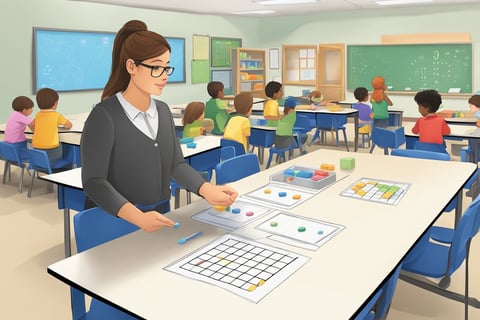Effective Math Teaching Strategies
Engage children with play, visuals, & logic for strong math foundations. Boost understanding & problem-solving
MATHMATH TODDLERS
11/21/20241 min read
Effective Math Teaching Strategies
Teaching math to children effectively requires engaging methods that stimulate interest and deepen understanding. Incorporating elements of play, visuals, and logic can enhance learning experiences and solidify foundational skills.
Incorporating Play in Learning
Playful activities are excellent for enhancing mathematical concepts in children. Games like counting exercises, puzzles, and math-themed board games make learning engaging. These activities promote active participation and reinforce skills in a fun environment.
Children can apply math concepts in real-life scenarios through role-playing games. For example, setting up a pretend store allows children to practice addition and subtraction while "purchasing" items. Interactive play fosters collaboration, communication, and critical thinking, contributing to a comprehensive grasp of mathematics.
Utilizing Visual Aids
Visual aids, such as charts, diagrams, and physical objects, can simplify complex math topics. Manipulatives like blocks or counters provide a tangible way for children to explore mathematical ideas. Visual representations help in breaking down abstract concepts into understandable parts.
Using video resources and interactive whiteboards can further engage students and cater to various learning styles. These tools make abstract math problems more concrete and accessible. Visual aids enable children to visualize problems, enhancing their problem-solving abilities and comprehension of mathematical relationships.
Encouraging Logical Reasoning
Promoting logical reasoning in children is essential for developing strong mathematical skills. Encouraging them to solve problems independently and articulate their thought processes helps build critical thinking. Problem-solving activities that require reasoning, such as sorting and classifying objects or identifying patterns, are beneficial.
Asking open-ended questions challenges children to think analytically. This approach fosters curiosity and promotes self-driven exploration of math concepts. Regular practice in logical reasoning equips students with essential skills for advanced mathematical thinking and practical decision-making in everyday situations.


Explore
Discover engaging educational toys and learning tools.
Contact Us
thescholarlysandbox@outlook.com
© 2025. All rights reserved.
Affiliate disclosure: As an Amazon Associate, we may earn commissions from qualifying purchases from Amazon.com.
